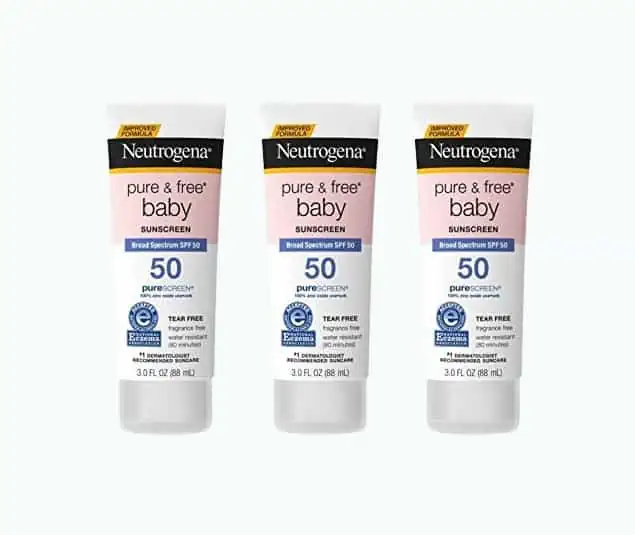We all know that the outdoors is one of the best places for kids to be. But even minimal exposure to the sun’s rays can cause your baby’s sensitive skin to burn and put your child at risk for long-term skin damage.
Sunscreen stops harmful rays from being absorbed into your baby’s skin, preventing burns and long-term sun damage. But it can be hard to know which sunscreens are best for your baby — especially when they are younger than the recommended age printed on many product bottles.
We’ve thoroughly studied the science and guidelines behind baby sunscreens and have created this guide to answer all your questions and clear up any confusion. We’ve also added our reviews of the best baby sunscreens currently on the market to help protect your little one’s delicate skin.
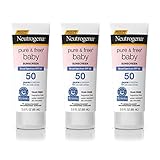
- Formulated for eczema-prone skin
- Doesn’t feel thick or oily
- Broad-spectrum protection
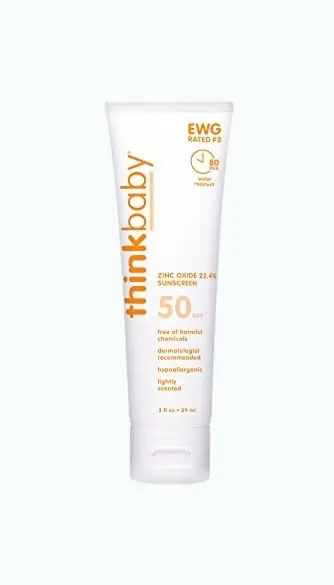
- Suitable size for air travel
- No harmful chemicals
- No sticky feeling
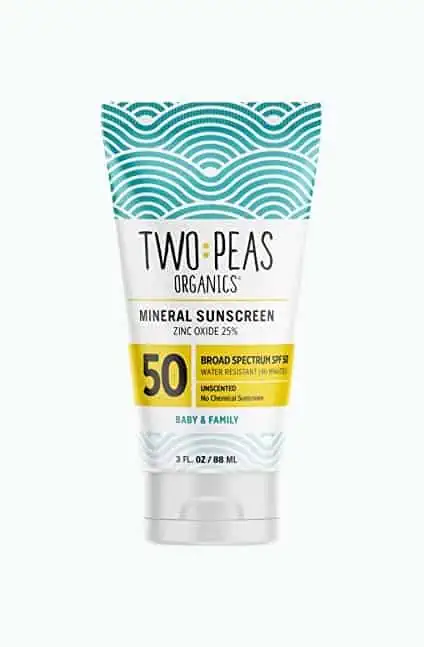
- Certified organic and safe
- Contains only 11 ingredients
- Fragrance free
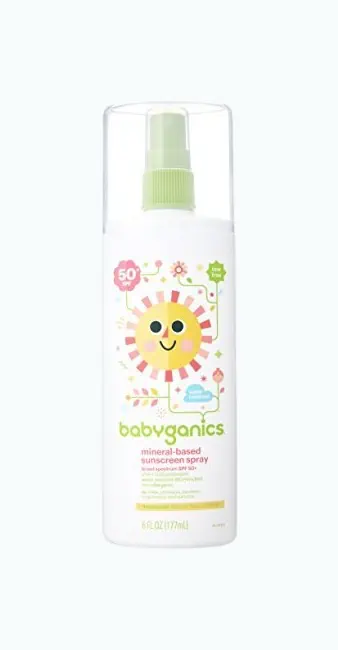
- Convenient spray application
- Water-resistant
- Won’t sting child’s eyes

- Gentle and soothing on irritated skin
- Full broad-spectrum protection
- Water resistant for 80 minutes

- BPA-free
- Broad-spectrum protection
- Paraben and fragrance-free
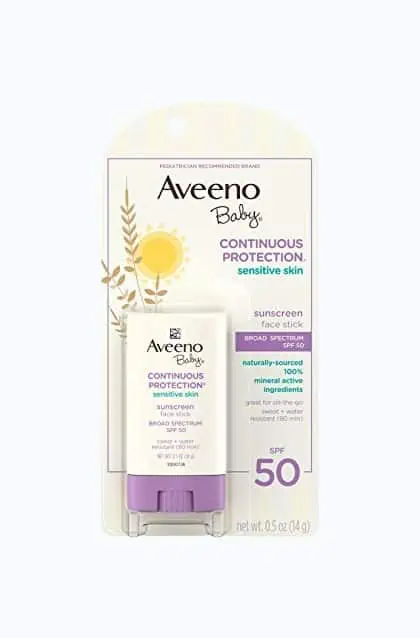
- Developed by dermatologists
- Water/sweat resistant
- Offers barrier protection
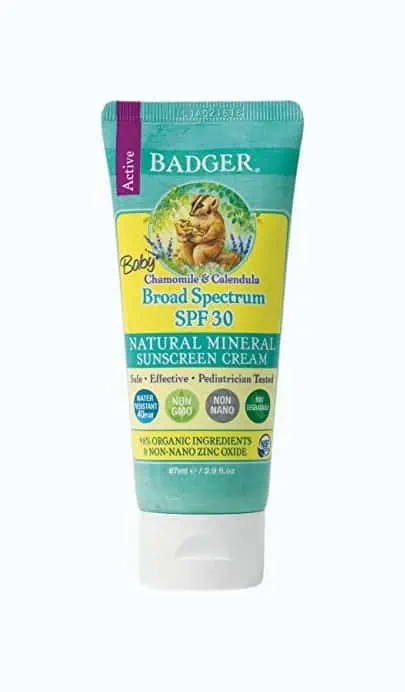
- 100% natural formula
- Biodegradable plastic bottle
- 40 minutes water & sweat resistant
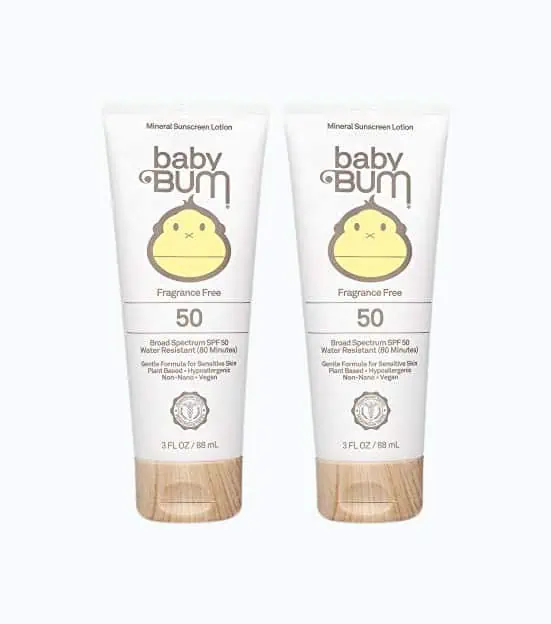
- Long-lasting and hypoallergenic
- Hydrating but non-greasy
- Tested by dermatologists
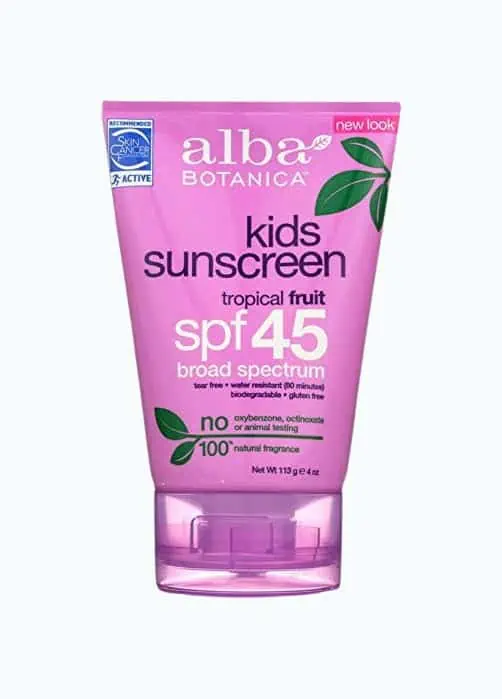
- Cruelty-free
- Water resistant
- Plant-based formula
Review Methodology: At Mom Loves Best, our professional team provides a thorough analysis and hands-on assessment of the best sunscreen for babies, using reliable data and real-life experiences. We evaluate products from a user’s perspective, focusing on criteria such as effectiveness, safety, and ease of application. Our research includes benchmarking, comparing, and ranking sunscreens based on their performance, ingredients, and design choices that affect users. We identify key decision-making factors, such as SPF level and water resistance, and rate each product in these areas. Trust our evidence-based findings and expert reviews to help you choose the perfect sunscreen for your little one’s delicate skin.
The Best Sunscreens for Babies of 2024
Here are 10 safe and effective sunscreens for babies.
Neutrogena Pure & Free Baby Sunscreen
Best All-Round Sunscreen for Babies
If you’re looking for a seal of approval, here it is. This sunscreen has been given the Seal of Acceptance by the National Eczema Association, practically guaranteeing that it won’t further injure or irritate your little one’s skin.
Offering SPF 50 mineral-based barrier protection, it prevents both UVA and UVB rays from attacking fragile skin.
It’s water-resistant, so you won’t need to keep reapplying after a swim, and most moms agree that this formula isn’t sticky or greasy.
Pros
- Specifically formulated for eczema-prone skin.
- Though it’s very effective, it doesn’t feel thick or oily on the skin.
- Broad-spectrum protection for peace of mind.
Cons
- It’s a little pricey.
- It may leave grease stains on fabrics.
Our Ratings
User Experience
ThinkBaby Safe Sunscreen SPF 50+
Best Natural Sunscreen for Babies
ThinkBaby has made a sunscreen that’s safe for baby’s skin, contains no questionable chemicals, yet still provides highly effective and gentle sun protection.
This product has earned a low toxicity rating from the Environmental Working Group (rating:2) but offers the maximum sun protection and water resistance levels available, according to FDA regulations.
We didn’t find this product to be sticky or greasy like some other options, and it was easy to wash off hands after application.
Pros
- Small tube is suitable for air travel.
- There are no harmful chemicals.
- Natural but effective.
- Washes off easily, so you won’t have sticky or greasy hands afterward.
Cons
- Thick formula takes time to rub in.
- Needs to be reapplied frequently to be effective.
Our Ratings
Personal Perspective
Two Peas Organics SPF 50 Sunscreen
Best Organic Baby Sunscreen
If you’re looking for a sunscreen that’s safe to put on your baby’s skin, this sunscreen from Two Peas Organics is the one for you.
The company prides itself on producing products made with 100% organic ingredients; you can be assured that no dangerous ingredients will come into contact with your little one.
This cruelty-free product is environment-friendly since it doesn’t contain any traces of harmful chemicals like phthalates, parabens, PABA, and BPA.
It’s also made with a mineral-based formula for extra peace of mind.
Pros
- Certified organic and safe.
- Contains only 11 ingredients, without potentially toxic fillers and additives.
- Fragrance-free formula.
Cons
- This is more expensive than other options.
- It’s very thick.
Our Ratings
Community Feedback
Babyganics Mineral-Based Sunscreen Spray
Best Baby Sunscreen Spray
This product is essentially the best of both worlds — offering the convenience of a spray application with the effective coverage of a mineral sunscreen. The non-misting spray will not become airborne, so you don’t have to worry about your baby inhaling it.
It provides broad-spectrum (UVA and UVB) protection and is made with a gentle, non-allergenic formula that is easy on the skin and will not sting your baby’s eyes.
Finally, you can be assured that there are no phthalates or parabens, giving you the confidence that you are choosing a product that’s safe for your little sunbeam.
Pros
Cons
- Needs to be rubbed in after spraying.
- May stain white clothing.
- Formula includes filler chemicals.
Our Ratings
First-Hand Impression
CeraVe Baby SPF 45 Sunscreen
Best Fragrance-Free Sunscreen for Babies
This is labeled as a “baby” sunscreen, but it’s so gentle that you just might use it on yours, too.
The ingredients are naturally sourced and contain no irritating additives like parabens, fragrances, or sulfates.
CeraVe offers broad-spectrum coverage that is kind to delicate and easily irritated skin — including babies with eczema.
Pros
- Gentle and soothing on irritated skin.
- Water-resistant for 80 minutes.
- Fragrance-free and neutral-smelling formula.
Cons
- Can be difficult to rub in.
- The 3.5 oz. tube doesn’t last long.
Our Ratings
User Experience
Blue Lizard Australian Baby Sunscreen
Best Baby Sunscreen for Sensitive Skin
Sunscreen standards in Australia are the most stringent in the world, and that’s where this brand originates.
The mineral-based cream provides broad-spectrum protection without the iffy chemicals that make up traditional formulas.
It’s also creatively packaged in a bottle that turns a deeper color based on the number of UV rays present, which is a nice reminder to keep applying throughout the day.
The formula is identical to its “sensitive-skin” product, so you know it’ll be gentle on your child’s skin.
Pros
- BPA-free packaging.
- Paraben-free and fragrance-free.
- Packaging indicates the presence of UV rays.
Cons
- May appear oily/shiny on skin.
Our Ratings
Personal Perspective
Aveeno Baby Continuous Protection SPF50 Sunscreen
Best Baby Sunscreen Stick
Made with oats and developed in partnership with dermatologists, this sunscreen stick will keep your baby safe from the sun without causing irritation or breakouts.
Because it’s a mineral-based product, it creates an invisible barrier on your baby’s skin, protecting against harmful rays that enter the skin and cause burns or damage.
100% naturally sourced, this option is a safe and gentle choice for your little one’s face.
Pros
- Developed by dermatologists.
- Water and sweat-resistant.
- Offers barrier protection.
- Easy to apply on the face.
Cons
- Expensive.
- It’s hard to rub in completely.
Our Ratings
Community Feedback
Badger SPF 30 Baby Sunscreen Cream
Best Reef Friendly Sunscreen
This sunscreen harnesses the power of natural minerals. With zinc oxide as the main ingredient, it offers broad-spectrum protection from UVA and UVB rays without any added chemicals.
Other natural ingredients include sunflower oil, beeswax, and vitamin E, formulated to provide an ultra-moisturizing and soothing effect. Because the ingredients are organic, it’s safe for your baby’s sensitive skin. It has even been tested by pediatricians to be safe for babies and toddlers.
For those concerned about the ocean, the chemical-free formula isn’t the only impressive thing. The bottle is made from recyclable plastic and is also biodegradable, making it safe for coral reefs and other ecosystems.
The formula should be thickly applied and begins working immediately. It’s both water and sweat-resistant for up to 40 minutes. This is a good option for eco-friendly moms who want a sunscreen that’s good for them and the environment.
Pros
- 100 percent natural formula is safe for the environment and your baby’s sensitive skin.
- The biodegradable plastic bottle won’t damage coral reefs or ecosystems.
- Water and sweat-resistant for up to 40 minutes.
Cons
- Very thick formula takes some time to blend in.
- The fragrance-free formula has a strong “earthy” scent.
Our Ratings
First-Hand Impression
Baby Bum Mineral Sunscreen Lotion
Best Ultra-Soft Covers
Baby Bum is dedicated to ensuring the products you put on your little one’s skin are safe and healthy. Enjoy warm summer days with your kids when using the Baby Bum Mineral Sunscreen Lotion.
It’s formulated with a 100% mineral base, including naturally moisturizing ingredients. It includes natural zinc oxide, coconut oil, shea, cocoa butter, and other gentle ingredients that protect your children’s skin.
Your little ones will love wearing this all day since it doesn’t have a waxy, greasy, or oily finish. It’s lightweight, comfortable, and water-resistant for up to 80 minutes.
Pros
- 100% mineral-based formula.
- Hydrating but non-greasy.
- Hypoallergenic and dermatologically tested.
- Long-lasting coverage.
Cons
- Leaves a tiny amount of white residue.
- It’s hard to apply evenly.
Our Ratings
User Experience
Alba Botanica Tropical Fruit Spray
Best Smelling Baby Sunscreen
This gorgeous sunscreen is made from natural botanicals, so it’s bound to smell great. The fruity scent is pleasant but not overpowering, and unlike so many other sunscreens, it doesn’t smell like coconuts.
The bottle allows for ease of application without the dangers of a mist, and it’s good for the environment, too.
With a biodegradable and gluten-free formula, this sunscreen also offers broad-spectrum protection and an ample 80 minutes of water resistance.
Pros
- Doesn’t feel greasy.
- Infused with vitamin E.
- Water-resistant for up to 80 minutes.
- Plant-based formula contains fruity-smelling botanicals.
Cons
- You need to rub it in.
- Some ingredients may cause allergic reactions.
- It has a fragrance, which may irritate the skin.
Our Ratings
Personal Perspective
Why Should Your Baby Use Sunscreen?
The sun’s rays emit ultraviolet light that causes sunburns and skin damage and contributes to skin cancer. Children are particularly susceptible since one major sunburn during childhood can double their risk of melanoma (skin cancer) during adulthood (1).
There are two types of ultraviolet light: UVA and UVB, and both are damaging. UVA rays penetrate the deeper levels of the skin (the dermis) and cause damage to the cell’s DNA. UVB rays cause sunburns and also increase your risk of skin cancer (2).
Using sunscreen (especially broad-spectrum products that block both UVA and UVB rays) stops harmful rays from being absorbed into your baby’s skin, preventing burns and long-term sun damage.
Your child should be protected from the sun every time they go outside. Regardless of temperature or cloud cover, ultraviolet (UV) rays can always reach your child’s skin (3).
During cooler temperatures, your child’s body is often covered, and the sun doesn’t feel as intense. While it’s true that UV rays aren’t as strong in the winter, it’s still wise to slather it on all exposed skin throughout the year, as damaging rays are still present.
What SPF Should Baby Sunscreen Be?
One of the most significant factors to consider is the sun protection factor, shortened to “SPF” on the labels of most bottles. While there are some technical calculations about how long a particular “SPF” number will allow you to remain in the sun unscathed, the reality is, it’s never exact — the intensity of the UV rays differ by time and location (4).
The consensus is that you should choose a minimum SPF of 15. The higher the number, the greater the protection — although it’s not necessarily incremental. No level blocks 100% of the sun’s rays, and studies have shown that numbers above 30 provide little extra protection (5).
When it comes to sunscreen, it’s important to avoid complacency. Don’t allow a high SPF number trick you into thinking your little one is permanently protected all day. Instead, apply sunscreen liberally about 15–30 minutes before you plan to be in the sun and every 2 hours after that — regardless of SPF level.
The Different Types of Sunscreen
Sunscreen comes in a wide array of products. However, all of these fall into two main categories:
- Chemical
- Mineral
Chemical variants are also known as “traditional” sunscreens. When applied to your skin, they rub in completely. Chemicals in the spray or lotion absorb the ultraviolet rays that would otherwise damage and burn your skin. However, your skin absorbs these chemicals.
Mineral formulations are a newer kind of sun protection, and they’re becoming more popular. They’re known as “barrier” sunscreens as they actually put a physical barrier between the harmful rays and your skin, scattering and reflecting the rays. While effective and touted as a safer chemical-free option, the major drawback is that they are thicker and can leave a visible white residue on the skin.
Once you decide which type of sunscreen you prefer, consider which format will work best for your baby.
- Lotion or Cream: This traditional application will likely get you the deepest coverage as you need to rub it into the skin.
- Spray: Sprays are convenient because they release sunscreen evenly in a fine mist but can be dangerous if inhaled. They may not be the best option for babies or young children as they cannot be instructed to hold their breath during application.
- Mousse: This is similar in application to a spray, but the product does not come out in an airborne mist and needs to be rubbed in. A blend between a lotion and a spray, this is a safe but convenient option for babies.
- Stick: These are a great option for the face. They don’t run or drip into little ones’ eyes, and you can easily toss a stick in a beach bag and apply it on the go.
How to Choose a Sunscreen for Baby
When choosing sun protection for your baby or small child, keep the following in mind:
Should I Use Sunscreen on My Newborn?
Not Younger Than 6 Months
Before your baby reaches the six-month mark, reduce their sun exposure during peak hours, and opt for sun hats and clothing with a sun protection factor (SPF).
After six months, choose a brand that’s formulated specifically for babies to reduce the chance of irritating their sensitive skin. You can use “baby” sunscreen on toddlers and older children as well.

